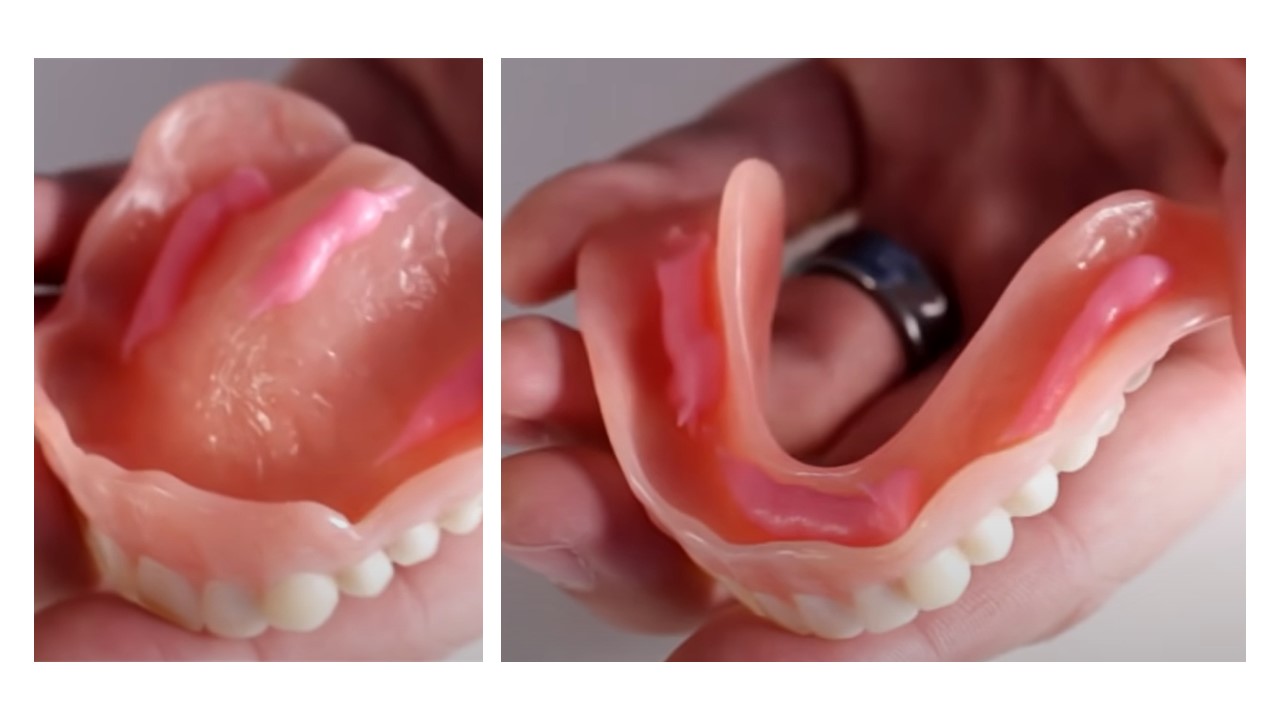
A surprise confronts you when begin to use dentures, daily reapplication of adhesive and thorough area cleaning. Prosthesis adhesives are formulated with the unique requirements of both prostheses and patients in mind; hence, an adhesive suitable for one may not be suitable for someone else. The glue you use now might not work as well later.
Even if you are unaware, minor alterations in oral morphology and emerging periodontal issues may necessitate the replacement of your adhesive. So, it is not just about brand or quality, infect the issue require more than just being aware of a few brands.
This article delves deep into denture adhesives, covering every angle from the perspective of dental specialists.
Detailed Types of Denture Adhesives
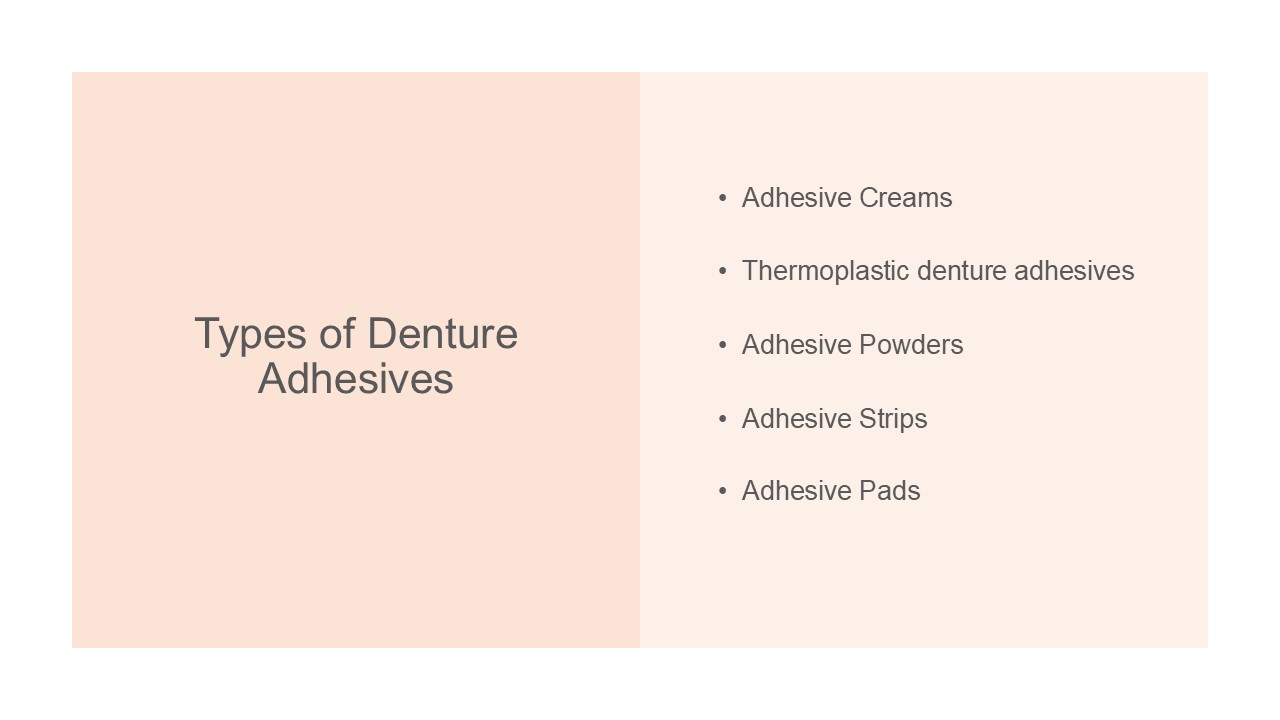
Dental prosthesis adhesives are categorized into five distinct groups. Each type has its own advantages and disadvantages. You can find a comprehensive analysis of these five types of adhesives down below.
Adhesive Creams
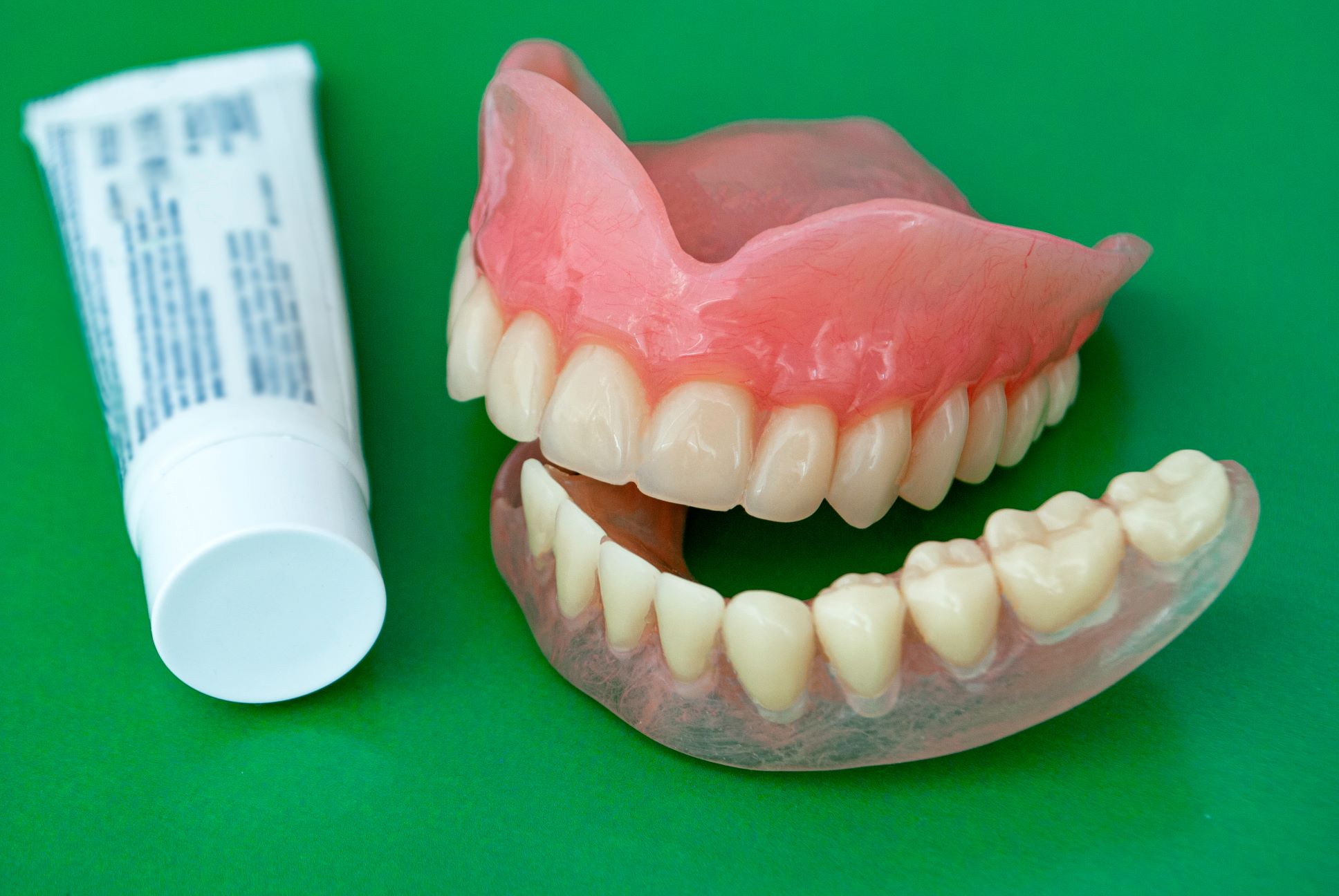
Adhesive Creams are the most favoured adhesive type. You can apply these adhesives straight to your prosthetic. Cream adhesives activate through interaction with saliva. Once applied, it expands and create a dense buffer area which makes it possible for the prosthetic to withstand hard chewing pressures.
How to Use Adhesive Creams
A three-step process is all it takes to apply cream adhesives.
Step-by-step application process
- Thoroughly cleanse and dry your dentures: Prior to application, it is essential to meticulously eliminate any residual glue using a denture brush. To that end, you can also ask your pharmacist about gum-safe cleaning products. After you've washed your mouth out, give it a good rinsing with water and rub the inside with a clean napkin..
- Apply the Adhesive Cream to the Dentures: Put the glue to the denture in strips for application. Applying an excessive amount could cause it to overflow, which could lead to pain while you're out and about.
- Denture Insertion: After denture glue has been applied, denture should be placed in mouth and pressed for 5 seconds. The glue will be spread out more uniformly in this way.
Use a clean, moist cloth to wipe away any excess residue that may have accumulated during the bonding process.
Advantages of Cream Adhasives
The primary benefits of cream adhesives are as follows.
- They are very powerful adhesives that ensure excellent retention of dentures within the oral cavity.
- Their substantial thickness enables them to accommodate gum recession or the introduction of new dentures.
Desadvantages of Cream Adhasives
- Cream adhesives have a major downside: they are difficult to clean up after.
- When poorly applied, cream adhesives touch the tongue and leave a bad aftertaste.
- Some patients try to fix problems with their dentures with cream adhesives because of the thick layer they provide. Nevertheless, the imperfections in the prosthesis must be rectified or substituted by a professional.
Thermoplastic denture adhesives
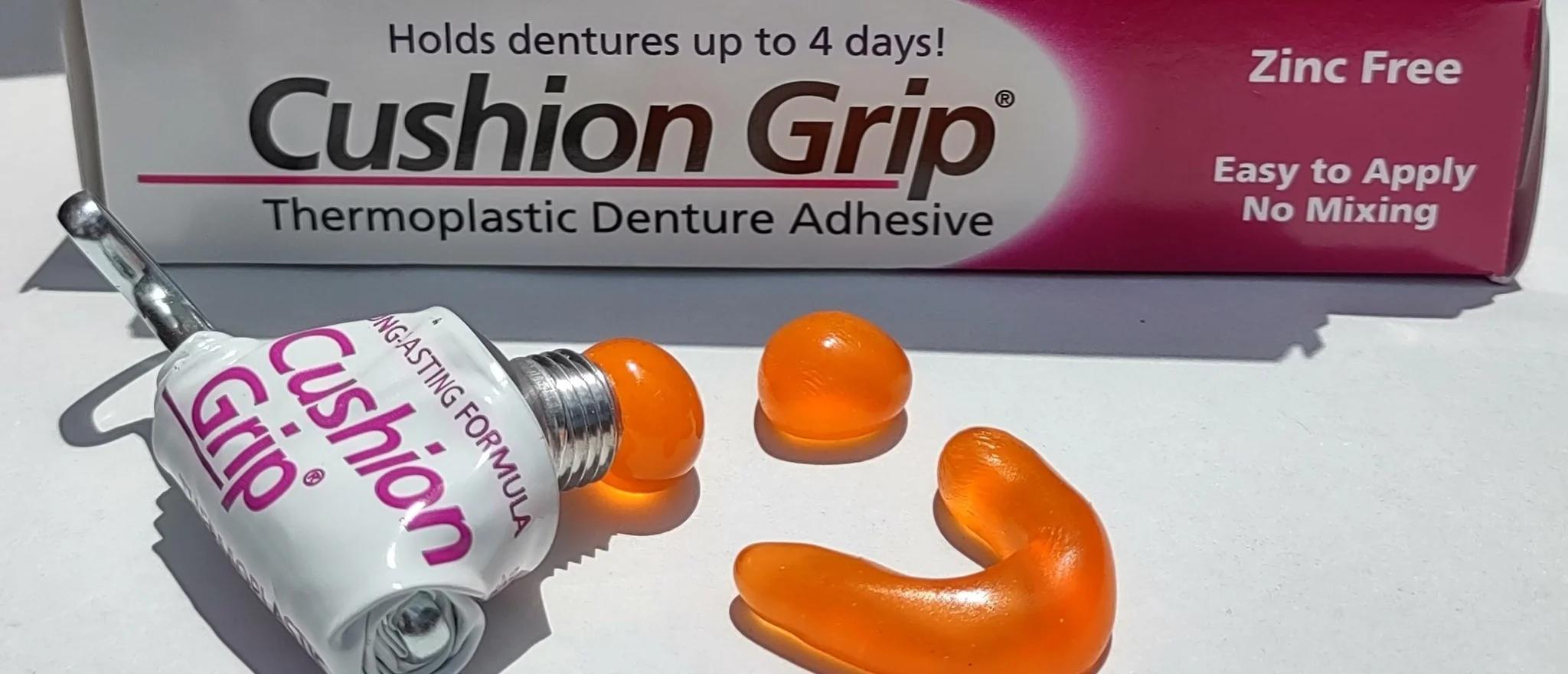
Thermoplastic denture adhesives has a unique structure that becomes pliable upon heating and hardens when it cools, ensuring prolonged retention. Due to their thermoplastic characteristics, these adhesives can maintain retention for up to four days and alleviate discomfort by serving as a cushion between the gum and the prosthesis.
How to Use Thermoplastic Denture Adhesives
There are just three simple procedures to applying thermoplastic denture adhesives.
- Cleaning the denture: Following a thorough cleaning, rinse the prosthesis thoroughly with water and then let it dry entirely.
- Adhesives for thermoplastic dentures: The thermoplastic prosthesis is detached by expelling a portion of the glue. The next step is to roll the adhesive using your hands. Then, apply the glue to the gaps of the prosthesis resting on the gums, exert light pressure, and allow the adhesive to set for 5 minutes.
- In the final stage, position the dentures in your mouth and exert pressure for 30 seconds.
Advantages of Thermoplastic prosthetic Adhesives
The primary benefits of thermoplastic adhesives are as follows.
- They offer prolonged adhesion for a duration of up to 4 days providing extended comfort extended comfort compared to alternative adhesives.
- They create a barrier in the prosthesis's frontal part, preventing the jamming of food.
- When chewing hard foods, they provide comfort due to their exceptional cushioning qualities.
Advantages of Thermoplastic denture Adhesives
The primary drawbacks of thermoplastic adhesives are as follows.
- Adhesive Cleaning: Thermoplastic adhesives securely bond the denture to the gum. Nonetheless, removing the denture or reapplying the adhesive as required can prove challenging.
- Thermoplastic materials exhibit heat sensitivity. Ingesting excessively hot foods or beverages may diminish adherence and necessitate reapplication.
Adhesive Powders
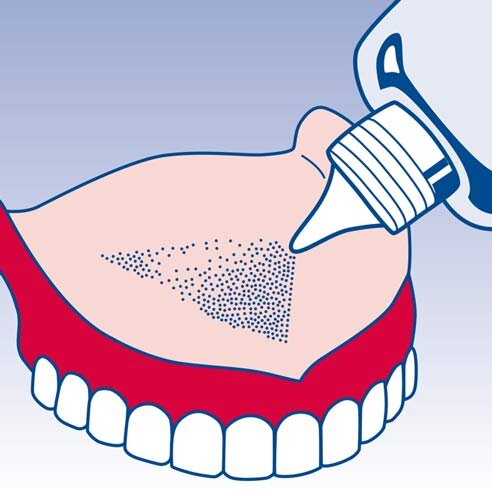
Powder adhesives are utilized by pouring to coat the prosthetic. Despite possessing a thinner layer than cream adhesives, they exhibit superior adhesion strength. Cellulose gum is predominantly utilized in powder adhesives, swelling upon contact with water. Vegetable powder adhesives, on the other hand, utilize a carbohydrate component known as Pectin, which is derived from fruits.
How to Use Adhesive Powders
The powder adhesives are simple to use and require only three steps to attach to the denture.
Step-by-step application process
- Clean and Moisten Your Dentures: Prior to using the powder adhesives, you must rinse your denture impression with clean water and inspect it meticulously.
- Apply the powder: After cleansing, dispense the powder adhesive onto the denture without allowing it to dry. Subsequently, gently shake the denture to eliminate any surplus material.
- Insert the Dentures into Your Oral Cavity: Subsequently, put the dentures on your gums and exert pressure with your hands for few seconds.
Advantages of Powder Adhesives
The primary benefits of using sticky powders are.
- Lightweight and Comfortable: After curing, a thin layer of powdered glue is applied and left in the mouth. Consequently, numerous individuals perceive that powdered adhesives result in less oral crowding.
- Tasteless and Odorless: There is no aftertaste or smell to powder adhesives..
Disadvantages of Powder Adhesives
The primary drawbacks of powder adhesives are as follows.
- Less Comfort: Due to their application in a minimal layer, these adhesives fail to ensure adequate adhesion once the prosthesis has deteriorated beyond its lifespan. In other words, they are unable to entirely eliminate the spaces between the denture and the palate.
- Reduced Cushioning: Powder adhesives have less cushioning capacity compared to cream and pad adhesives. Consequently, they fail to deliver the requisite chewing comfort, particularly while masticating hard substances.
Adhesive Strips
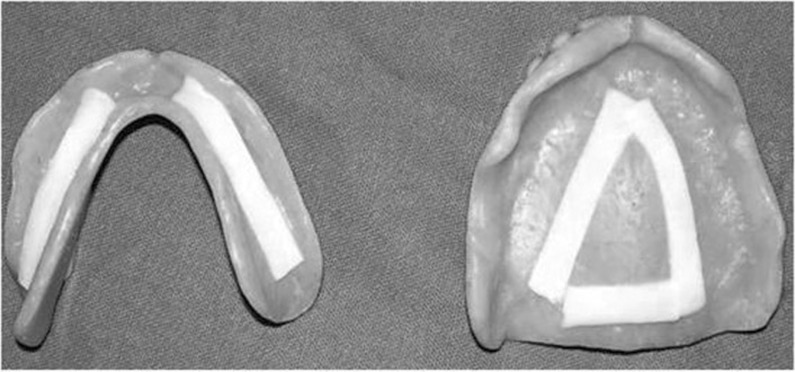
Adhesive strips are available pre-applied for immediate use. The strips, which possess robust adhesive properties, can also be applied effectively on troublesome and distorted dentures. Strip adhesives can guarantee the proper alignment of these dentures, thereby reinstating the previous bite configuration. By firmly bonding to the jaw and the prosthesis, adhesive strips efficiently keep food from getting stuck.
How to Use Adhesive Strips
There are three simple methods to apply adhesive strips.
Step-by-step application process
- Thoroughly Clean and Dry Your Dentures: Be sure to thoroughly rinse your mouth and remove any food debris before applying the strip adhesive to your dentures. After that, use a clean, gentle cloth to dry the dentures.
- Peel of the strips: Carefully take the packing off the strips. While peeling, make sure the glue doesn't come into touch with anything. Stick the strips as tightly as possible to the edges while you glue them.
- Position the strips on the dentures and insert to the mouth: Insert the prosthesis into your mouth and exert gentle pressure. Then, within five seconds, it will adhere to the inside of the mouth after it comes into contact with saliva.
Advantages of Stripe Adhesives
Listed below are some of the main advantages of Stripe Adhesives.
- Pre-measured and convenient: Adhesive strips are available in pre-packaged and ready to use. You don't need to measure anything to adjust them.
- Close the gaps: If you're experiencing denture discomfort due to space between your teeth caused by gum recession, these adhesives can help.
- Consistent Adhesion: These adhesives apply consistent pressure across the denture since they are evenly distributed throughout.
Disadvantages of Stripe Adhesives
- The strip adhesives are not tailored to accommodate your prosthesis: As they are manufactured in standard sizes, they may not conform precisely to your prosthesis. However, you may tailor them to your specific prosthesis while modifying your own.
- Frequent Replacement: Certain brands may necessitate replacement following meals.
Adhesive Pads
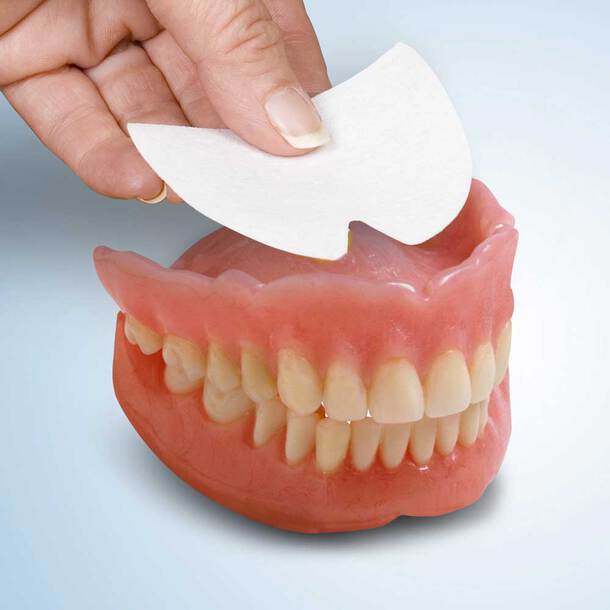
Adhesive Pads are soft, pliable sheets that can provide strong adhesion and cushioning. These adhesives are particularly useful for people with gum problems or deteriorated dentures. In addition to being able to effectively seal denture gaps, adhesive pads are the thickest kind of denture adhesive.
How to Use Adhesive Pads
There are just three simple steps to applying Adhesive Pads, which is quite similar to using strips.
Step-by-step butep application process
- Clean and Dry Your Dentures: The denture and oral cavity must be devoid of all food and adhesive remnants prior to commencing the treatment. The prothesis must thereafter be dried using a clean, dry, and soft cloth.
- Prepare the Adhesive Pad: Trim the adhesive pad to the dimensions of the denture. Then affix the pad with the pink side toward the interior of the denture and the white side facing the exterior. Lastly moisten the pad slightly before to inserting it into your mouth.
- Insert the Denture: After finalizing the bonding procedure, apply gentle pressure to the denture using your hand.
Advantages of Adhesive Pads
The primary benefits of adhesive pads are as follows:
- Extra Cushioning and Comfort: Adhesive pads has the greatest thickness and optimal cushioning capability among prosthetic adhesives.
- Secure Hold: Adhesive pads are quite strong adhesives and do not cause issues such as slippage, displacement, or displacement of the prosthesis.
Disadvantages of Adhesive Pads
- Thickness and Discomfort: The thick nature of Adhesive Pads may provide the illusion of an object in the mouth. This does not apply to all users..
- Affection of tongue movements: Although not often, in certain patients, particularly those with lower prostheses, the tongue may contact the prosthesis. This generates a circumstance that disrupts the patient during verbal communication.
Factors to Consider When Choosing a Denture Adhesive
A denture adhesive is assessed from five distinct perspectives. Now let's have a look at the things you should be careful of when choosing a denture adhesive.
Hold Strength
Adhesives for prosthetics work best when applied 12-16 hours before removal. An adhesive that last shorter or longer than this period is not healthy because it may stimulate bacterial or fungi infection. On the other hands powerful are hard to clean during replacement, whereas weaker ones disrupt the patient's routine.
Denture adhesives are also expected to prevent food and drink from becoming stuck under the dentures. Another outcome of a strong adhesion is that they withstanding excessive heat during the day.
Ingredients and Allergies
When it comes to adhesives for dentures, zinc is by far the most common allergy. Because they contain parabens, artificial colorants, and certain preservatives, these adhesives can make allergies worse. Those who suffer from allergies may find that herbal adhesives are a better alternative.
Ease of Use
Because of its frequency of usage, denture adhesive should be easy to apply and clean. Inadequately cleaned adhesives might let bacteria and fungus to grow in the mouth over time.
Taste and Texture
When you use some adhesives, your mouth will feel like it's being stuck, but when you use others, they won't help you chew at all. Furthermore, some adhesives have a metallic flavor due to the zinc content, while others have more pleasant herb or fruit flavors. Some of them are so bland that you won't even taste them. Ideal would be adhesives that don't leave an unpleasant taste.
Price and Value
Adhesives for dentures are inexpensive items which is about fifteen to twenty-five dollars. So, rather than money you should pay attention to your own requirements.
Top Denture Adhesives on the Market
Denture adhesives come in a wide variety, each developed for a different kind of patient. Among these wide options, you should pay attention to whether the product is suitable for you rather than for reasons such as price or quality. The majority of negative feedback on products is caused by patients' incorrect adhesive preferences. With that in mind, here are some of the most well-known brands and products:.
Fixodent Original Denture Adhesive Cream
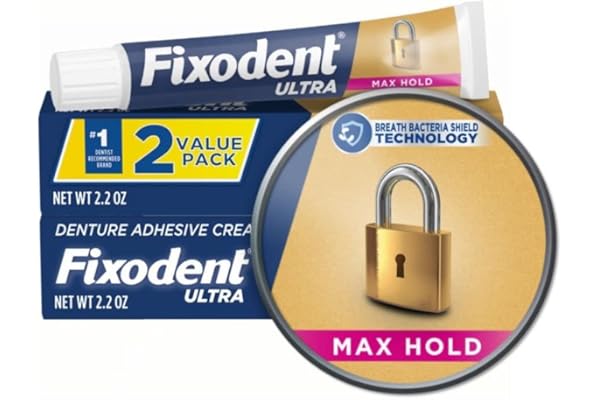
Regarding adhesives, Fixodent is at the top of the heap. It offers a diverse selection of products all over the globe. This glue is suitable for both full and partial dentures.
Cushion Grip Thermoplastic Denture Adhesive
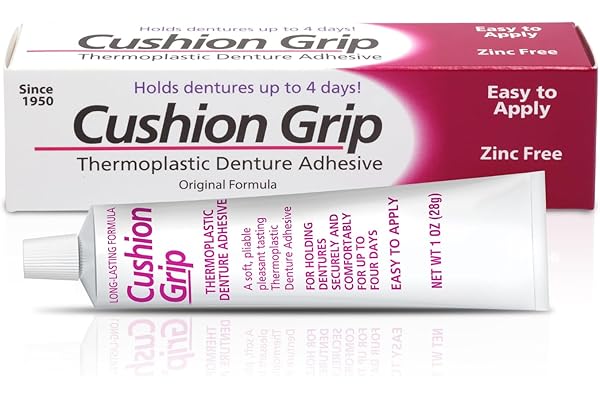
Cushion Grip is the most favoured brand in the thermoplastic adhesive category. The company, established in the 1950s, has succeeded in becoming a leading seller of Thermoplastic adhesives.
Super Poligrip Zinc Free Denture Adhesive
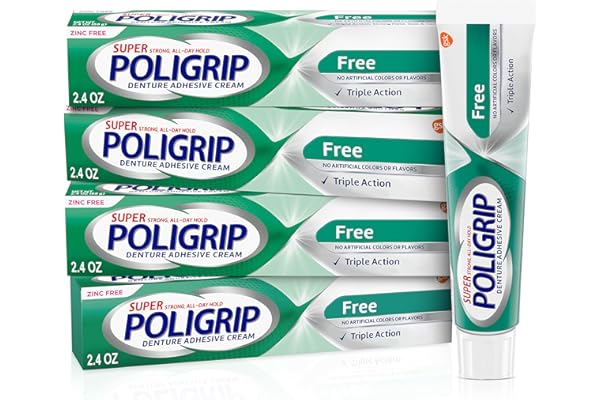
Zinc-free denture sealants made by Poligrip are a well-known and well-liked brand. Poligrip Products don't contain any fake sweeteners and are easy to use because they keep food from getting stuck all day.
Secure Waterproof Denture Adhesive

Secure is a strong glue that sticks quickly, so you can use it at any time of the day. It's an adhesive that doesn't smell bad and can soften well by filling in the gaps in the prosthesis.
Sea Bond Secure Denture Adhesive Seals
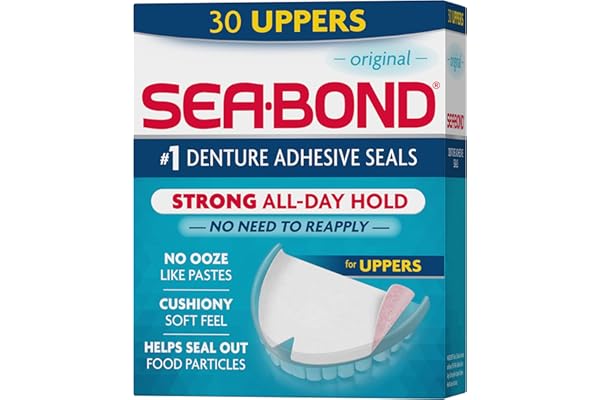
The Sea Bond pad is a staple in the adhesive industry. There is no flavor or smell to this product, which contains zinc and artificial sweeteners. Thanks to its great cushioning capacity, this product will keep you comfortable all day long.
Poligrip Denture Adhesive Powder
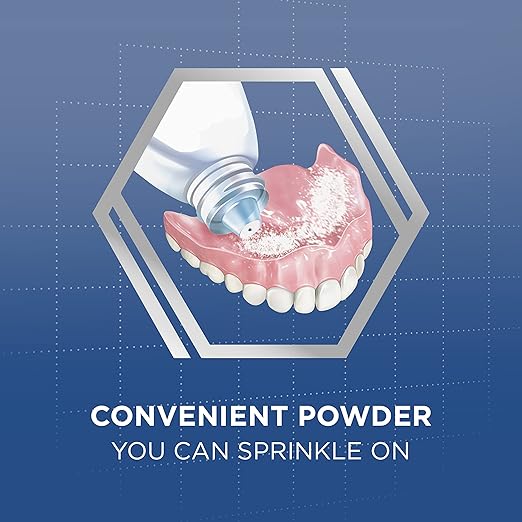
This powder adhesive produced by Poligrip is applied on the dentures in a thin layer. Due to the minimal cushioning capability, these adhesives may be utilized during the initial month or two following the renewal of your prosthesis. Subsequently, you may transition to denser items with elevated cushioning capabilities.
Polygrip Stripe Adhesive:
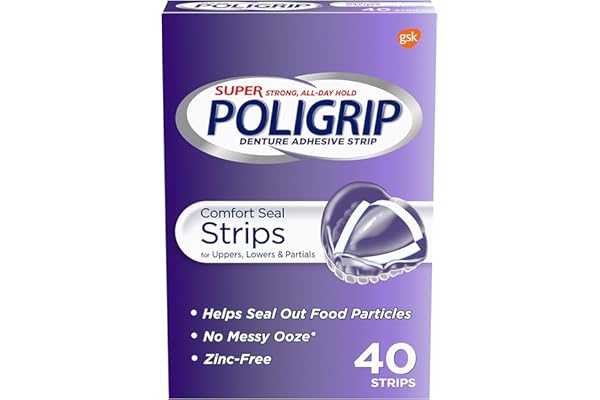
This product, manufactured by Polygrip, ranks among the most favored items among enthusiasts of removable stripe adhesive. The adhesive, composed of cellulose gum, offers robust stickiness throughout the day.
Frequently Asked Questions (FAQ)
Presented below are commonly posed inquiries and their corresponding responses regarding denture adhesives.
How long does denture adhesive last throughout the day?
Denture adhesive usually lasts for a day, meaning it can last for about 12 to 16 hours. However, depending on the amount of eating, drinking, and saliva, this period may vary from person to person. If you eat very hot foods or rinse your mouth frequently, the effect of the adhesive may be shorter.
Is it safe to use denture adhesive every day?
Yes, it is generally safe to use denture adhesive on a daily basis. However, it is important to pay attention to oral hygiene and use the appropriate amount in accordance with the instructions. If you experience any irritation or discomfort, you should consult your dentist. Also, some adhesives may contain zinc; Long-term overuse can increase zinc levels.
Can denture adhesive cause health problems?
Prosthetic adhesives can have herbal and non-herbal components that can cause allergies. Using an adhesive for a long time means prolonged exposure to the same component. Therefore, if you think that these adhesives will adversely affect your health, you should replace them with different types of prosthetic adhesives with different contents.
How do I remove denture adhesive from my gums and dentures?
To remove denture adhesive from the gums and dentures, you can rinse your mouth with warm water or gently clean it with a soft denture cleaning brush. In addition, denture cleaning solutions can also help with this. It can also be effective to use a damp cloth or gauze to remove any debris that has stuck to the gums.
Are there any natural denture adhesive options?
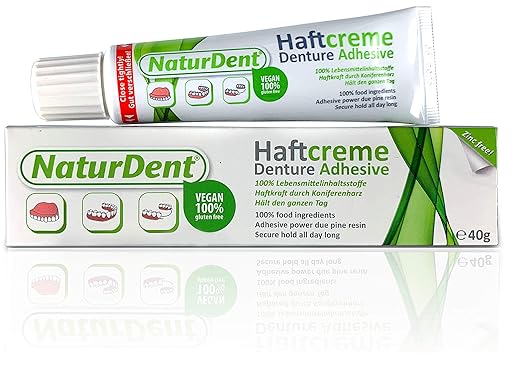
Yes, there are some natural denture adhesive options available. This product, which is produced by Naturedent, is also highly appreciated by users. However, among the natural alternatives, there may be adhesives containing allergens including this one.
What should I do if my dentures are still loose even with adhesive?
If your dentures are still loose despite using adhesives, you should consult a dentist. Prostheses may need to be adjusted or renewed. Trying to solve the problem by using more glue instead is a big and common misconception. Sometimes the structure of the mouth changes over time and the prostheses need to be readapted.
Can I eat all types of food with denture adhesive?
When using denture adhesive, you can easily consume most foods. However, avoiding foods that are too hard, sticky, or difficult to chew prolongs the life of their dentures and increases their comfort. For example, hard-shelled nuts or sticky candies can damage their dentures.
How much denture adhesive should I apply?
The mouths of glue tubes can be of different thicknesses. Tubes with thin mouths can be applied in the form of strips. However, thick-mouthed tubes are usually applied in the size of a pea, and the adhesive is spread over the prosthesis. You should not use the glue more than necessary. Otherwise, allergic complications may increase, it will leave a bad taste in the mouth and it will be difficult to clean.
Is it okay to sleep with dentures in using adhesive?
Sleeping with dentures is generally not recommended. Removing dentures overnight allows the oral tissues to rest and the dentures to be cleaned. Also, removing dentures overnight helps keep gums healthy and reduces the risk of infection.
Do I need different adhesives for upper and lower dentures?
Often the same denture adhesive can be used for both upper and lower dentures. However, some products may be specifically designed for upper or lower dentures, so it is helpful to read the product instructions. Some users may prefer separate adhesives because they want different levels of grip in different areas.
Can denture adhesive improve speech clarity?
Yes, a properly applied denture adhesive can improve speech clarity by keeping dentures in place. Especially for those who use new dentures, the adhesive can help make tongue and lip movements more natural.
Why does my denture adhesive have a bad taste?
The bad taste of denture adhesive may be due to some of the ingredients in it. Trying a different brand or using a product that contains a sweetener may solve the problem. In addition, paying attention to oral hygiene and cleaning dentures regularly can also improve taste.
How often should I replace my dentures?
Dentures usually need to be replaced every 5 to 7 years. However, this period may vary depending on changes in the structure of the mouth and the condition of the prosthesis. If you notice cracks, fractures or discoloration of the dentures, it may be necessary to replace them sooner.
What should I do if my dentures are still loose even with adhesive?
If your dentures are still loose despite utilizing adhesives, you should contact a dentist. Prostheses may require adjustment or replacement. Utilizing additional adhesive to address the issue is a prevalent and significant fallacy. The morphology of the oral cavity may alter over time, necessitating the readaptation of prosthesis.
Can I eat all types of food with denture adhesive?
When using denture adhesive, you can easily consume most foods. However, avoiding foods that are too hard, sticky, or difficult to chew prolongs the life of their dentures and increases their comfort. For example, hard-shelled nuts or sticky candies can damage their dentures.
How much denture adhesive should I apply?
The mouths of glue tubes can be of different thicknesses. Tubes with thin mouths can be applied in the form of strips. However, thick-mouthed tubes are usually applied in the size of a pea, and the adhesive is spread over the prosthesis. You should not use the glue more than necessary. Otherwise, allergic complications may increase, it will leave a bad taste in the mouth and it will be difficult to clean.
Is it okay to sleep with dentures in using adhesive?
Sleeping with dentures is generally not recommended. Removing dentures overnight allows the oral tissues to rest and the dentures to be cleaned. Also, removing dentures overnight helps keep gums healthy and reduces the risk of infection.
Do I need different adhesives for upper and lower dentures?
Often the same denture adhesive can be used for both upper and lower dentures. However, some products may be specifically designed for upper or lower dentures, so it is helpful to read the product instructions. Some users may prefer separate adhesives because they want different levels of grip in different areas.
Can denture adhesive improve speech clarity?
Yes, a properly applied denture adhesive can improve speech clarity by keeping dentures in place. Especially for those who use new dentures, the adhesive can help make tongue and lip movements more natural.
Why does my denture adhesive have a bad taste?
The bad taste of denture adhesive may be due to some of the ingredients in it. Trying a different brand or using a product that contains a sweetener may solve the problem. In addition, paying attention to oral hygiene and cleaning dentures regularly can also improve taste.
How often should I replace my dentures?
Dentures usually need to be replaced every 5 to 7 years. However, this period may vary depending on changes in the structure of the mouth and the condition of the prosthesis. If you notice cracks, fractures or discoloration of the dentures, it may be necessary to replace them sooner.
Are there waterproof denture adhesives?
Yes, there are water-resistant denture adhesives available. These types of adhesives provide longer-lasting retention for those with high saliva flow or frequent contact with water. This type of adhesive can also be useful for those who are interested in swimming or water sports.
Can I use denture adhesive on partial dentures?
Yes, denture adhesive can also be used on partial dentures. However, it's a good idea to consult a dentist for the best results. It is important that partial dentures fit correctly, so the prosthesis may need to be adjusted instead of adhesive.
Conclusion
Finding the right denture adhesive has a huge impact on your daily quality of life and comfort. With a suitable adhesive, you'll feel safer when eating, talking, and smiling. Also, keep in mind that almost all of them are water-activated and need to be replenished every day; This provides the best grip all day long.
Ultimately, it may take some trial and error to find the best denture adhesive for you. By consulting your dentist, you can choose the product that best suits your personal needs. With that being said, it's important to experiment with different products to discover which one suits you best. Remember, making the right choice will improve your quality of life.
For detailed information about permanent prostheses, you can visit our All-on-4 and All-on-6 pages.
Note:The information provided on our website is intended for general informational purposes only and should not be construed as medical advice or used for diagnosis or treatment. Please consult your dentist or healthcare professional for personalized advice and treatment recommendations. Our content does not include details of any specific therapeutic health services provided by Antlara Dental.
